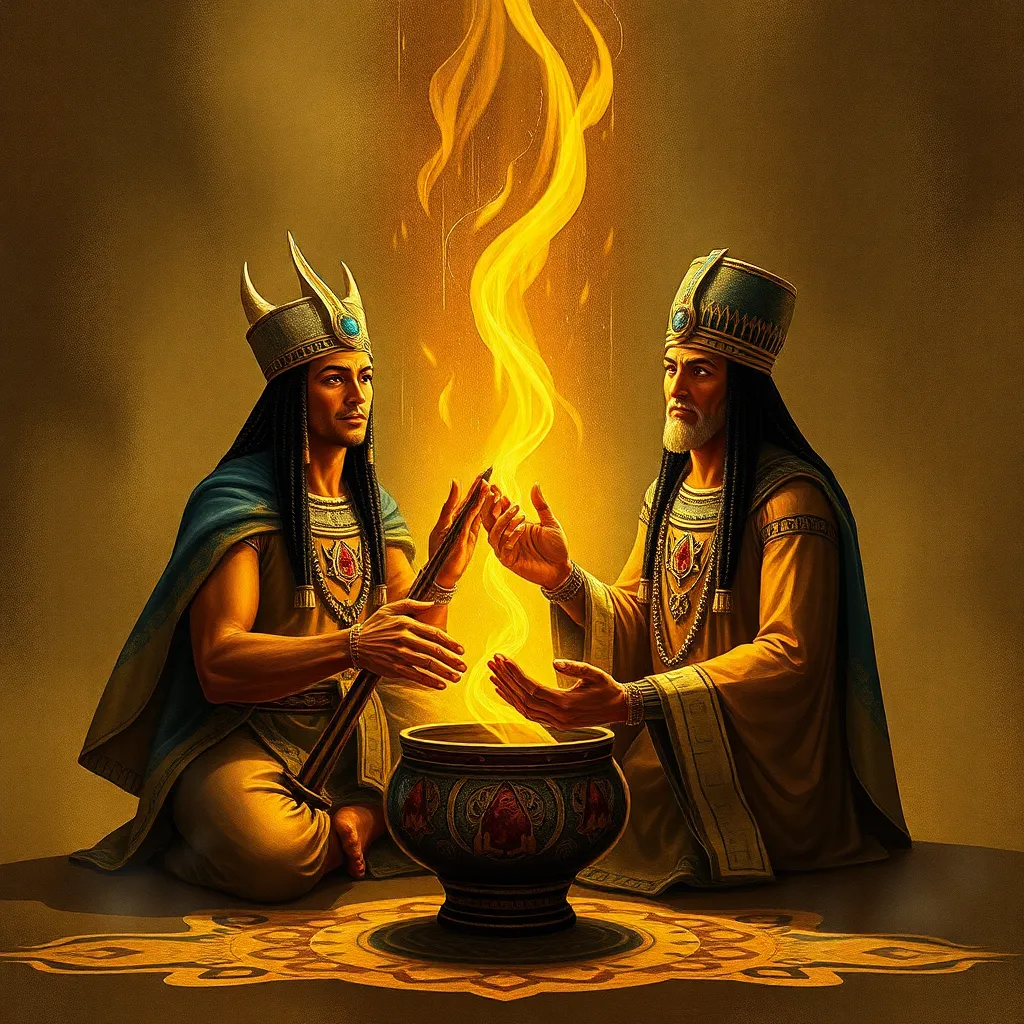Heka and the Ritual of Anointing: Sacred Oils and Magic
I. Introduction to Heka
Heka, in ancient Egyptian culture, is often defined as the concept of magic and the power of the divine. It is derived from the Egyptian word “Heka,” which signifies both a deity associated with magic and the actual practice of magical arts. Heka was not merely seen as sorcery or trickery; rather, it was considered a vital force that permeated the universe, allowing individuals to interact with the divine and the natural world.
In ancient Egypt, Heka played a crucial role in various aspects of life, including healing, protection, and spirituality. It was believed that through the practice of Heka, one could harness the powers of the gods, influence the forces of nature, and even alter the course of events. The Egyptians viewed Heka as a bridge between the mortal realm and the divine, where rituals and incantations could invoke the favor of the gods.
II. The Concept of Sacred Oils in Ancient Egypt
Oils held a significant place in ancient Egyptian rituals, often used in conjunction with Heka. Historically, oils were not just for physical anointing but were imbued with spiritual significance and believed to possess protective and healing properties.
- Historical Context: The use of oils dates back to the earliest dynasties of Egypt, where they were essential in funerary practices, religious rituals, and daily life. Oils were obtained from various sources, including plants, nuts, and flowers, and were often mixed with resins and perfumes.
- Types of Oils: Some of the most common oils included:
- Myrrh: Symbolized purification and was associated with healing.
- Frankincense: Represented divine presence and was often used in offerings to the gods.
- Lotus Oil: Associated with rebirth and spiritual awakening.
- Olive Oil: Used for anointing and symbolized peace and prosperity.
III. The Ritual of Anointing
The ritual of anointing in Heka was a sacred act performed to invoke divine presence, bless individuals, or purify spaces. Anointing involved the application of sacred oils on the body or objects, signifying the transfer of divine energy.
The process typically included the following steps:
- Preparation: The Heka practitioner would prepare the oils, often combining them with specific herbs and resins to enhance their properties.
- Invocation: Prayers and incantations were recited to call upon the gods or spirits associated with the oils.
- Anointing: The practitioner would then apply the oil, often on the forehead, hands, or feet of the individual or on sacred objects.
The significance of anointing extended beyond the physical act; it was believed to create a sacred connection between the anointed and the divine, facilitating spiritual healing and protection.
IV. The Magical Properties of Sacred Oils
In the realm of Heka, specific oils were closely associated with particular deities and magical practices, each carrying unique symbolic meanings. The magical properties of these oils were thought to enhance rituals and spiritual experiences.
- Association with Deities: Different oils were linked to specific gods, such as:
- Osiris: Oil of myrrh for resurrection and healing.
- Isis: Lotus oil for love and protection.
- Ra: Frankincense for invoking the sun god’s power.
- Alchemy of Oils: The alchemical nature of oils was significant, as they were believed to transform energies and elevate consciousness during rituals.
V. Heka Practitioners: Priests, Healers, and Magicians
Heka practitioners, including priests, healers, and magicians, held essential roles in ancient Egyptian society. They were responsible for performing rituals, healing the sick, and maintaining spiritual order.
- Roles and Responsibilities: Heka practitioners engaged in various duties, such as:
- Conducting rituals in temples.
- Administering healing using oils and incantations.
- Protecting individuals and communities from malevolent forces.
- Training and Knowledge: Becoming a Heka practitioner required extensive training in:
- Knowledge of sacred texts and spells.
- Understanding the properties of various oils and their uses.
- Mastery of rituals and the ability to communicate with the divine.
VI. Case Studies: Notable Anointing Rituals in Egyptian History
Throughout Egyptian history, several notable anointing rituals highlighted the importance of sacred oils and Heka.
- Famous Rituals: Some key examples include:
- The anointing of pharaohs during their coronation ceremonies, symbolizing divine approval and power.
- Funerary rituals where sacred oils were used to prepare the deceased for the afterlife.
- Impact on Society: These rituals reinforced the connection between the divine and the earthly realm, influencing Egyptian spirituality and culture.
VII. Modern Interpretations and Practices
In contemporary spirituality, there has been a revival of Heka practices, with many people seeking to reconnect with ancient Egyptian traditions.
- Revival of Heka: Modern practitioners often incorporate Heka into:
- Spiritual healing practices.
- Rituals that honor ancient deities.
- Use of Sacred Oils: Today, sacred oils are popular in wellness and magical communities, used for:
- Spiritual anointing in meditation and rituals.
- Creating a sacred space and enhancing personal energy.
VIII. Conclusion: The Enduring Legacy of Heka and Anointing Rituals
The legacy of Heka and the ritual of anointing continue to resonate in modern spiritual practices. As individuals seek to connect with ancient wisdom and harness the power of sacred oils, the significance of Heka remains relevant.
Preserving ancient rituals and their meanings is essential for understanding the complexities of spirituality and healing in today’s world. Heka teaches us that magic, when rooted in respect and intention, can bridge the past with the present, enriching our spiritual journeys.




